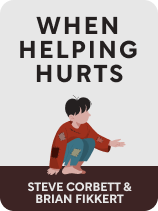

This article is an excerpt from the Shortform book guide to "When Helping Hurts" by Steve Corbett and Brian Fikkert. Shortform has the world's best summaries and analyses of books you should be reading.
Like this article? Sign up for a free trial here.
How should you begin a poverty alleviation project? Should you be in charge?
In When Helping Hurts, Steve Corbett and Brian Fikkert advise that sometimes, other people or organizations are in a better position to minister to a given community than you or your church are. If that’s the case, you should let the people who are most qualified to do the project take charge of it.
Read below to learn why you should step back on your poverty alleviation project.
Let the Right People Craft the Approach
The authors pose three questions to ask yourself before taking on any poverty alleviation project. If you can’t confidently answer “yes” to all three questions, don’t take the project.
1. Do you fully understand the situation, including relevant local customs and culture? If not, don’t take charge of the project yourself. Instead, let a local church in the affected area or someone else who fully understands the situation take charge, and look for ways to support them on the project, such as by donating money.
2. Are local organizations incapable of meeting the need? If they’re able to meet the need themselves, don’t intervene. The goal is to empower people to take charge of their own lives and communities. Trying to help when it’s not necessary ultimately undermines their agency—which causes harm.
(Shortform note: As we’ve discussed, Corbett and Fikkert point out that intervening—rather than letting local organizations handle a crisis—can harm aid recipients psychologically and take customers away from local businesses. Others point out that it can also harm their social and political systems by making the government less accountable to the people. This is because when an outside agency steps in to meet a need, it takes pressure off the local government to address problems that may have created or contributed to creating the need.)
3. Are you actually capable of meeting the need? In situations where outside help is warranted because the local organizations don’t have the resources or qualifications to adequately address the situation, outside help is only beneficial when the outsiders have the necessary training, qualifications, and resources. If you try to help when you don’t know what you’re doing, you’ll just get in the way.
Are You the Right Person for the Job?
Corbett and Fikkert’s assertion that you need to understand the situation and culture and need to be objectively capable of meeting the need before you intervene mirrors business consultant Gino Wickman’s advice about personnel management in business. Considering his advice provides some additional insight on this subject.
In Traction, Wickman advises that for your company to be successful, you have to have the right people in the right positions. According to Wickman, the “right people” are those who are on board with your company’s culture and mission, while the “right positions” means matching job tasks to workers’ skill sets. Problems come up when either of these factors is off.
On the one hand, Wickman says someone could be the right person in the wrong position: She wholeheartedly embraces your company’s culture and mission, but she doesn’t have the right technical or interpersonal skills for the position. If that’s the case, she can’t thrive in that position and may end up causing problems for the company. Wickman says you need to move her into a position that matches her skill set, if there is one, or let her go if there isn’t.
Let’s apply this concept to a poverty alleviation project: If you answered “yes” to Corbett and Fikkert’s question about understanding the situation but “no” to their question about your ability to meet the need, that would make you the “right person in the wrong position” for that intervention. Applying Wickman’s advice, you should look for a different need that you’re better able to meet.
On the other hand, Wickman says someone could be the wrong person in the right position: He has the right technical skills to excel in his current position, but he doesn’t understand your company’s culture or doesn’t believe in the value of your product. In this case, Wickman says you need to let him go before he stirs up dissension within the company.
Similarly, if you answered “no” to Corbett and Fikkert’s question about understanding the situation but “yes” to their question about your ability to meet the need, that would make you the “wrong person in the right position” for that intervention. And this is even more of a problem in cross-cultural poverty alleviation than it is in business because the cultural differences are likely to be greater than the cultural difference between two companies. So, following Wickman’s advice, you don’t belong in that role. Instead, you need to find a role where you understand the culture and have the ability to make a difference.

———End of Preview———
Like what you just read? Read the rest of the world's best book summary and analysis of Steve Corbett and Brian Fikkert's "When Helping Hurts" at Shortform.
Here's what you'll find in our full When Helping Hurts summary:
- How many Christian church missions actually do more harm than good
- A look into the true nature and causes of poverty
- Suggestions for how to help the poor more effectively






